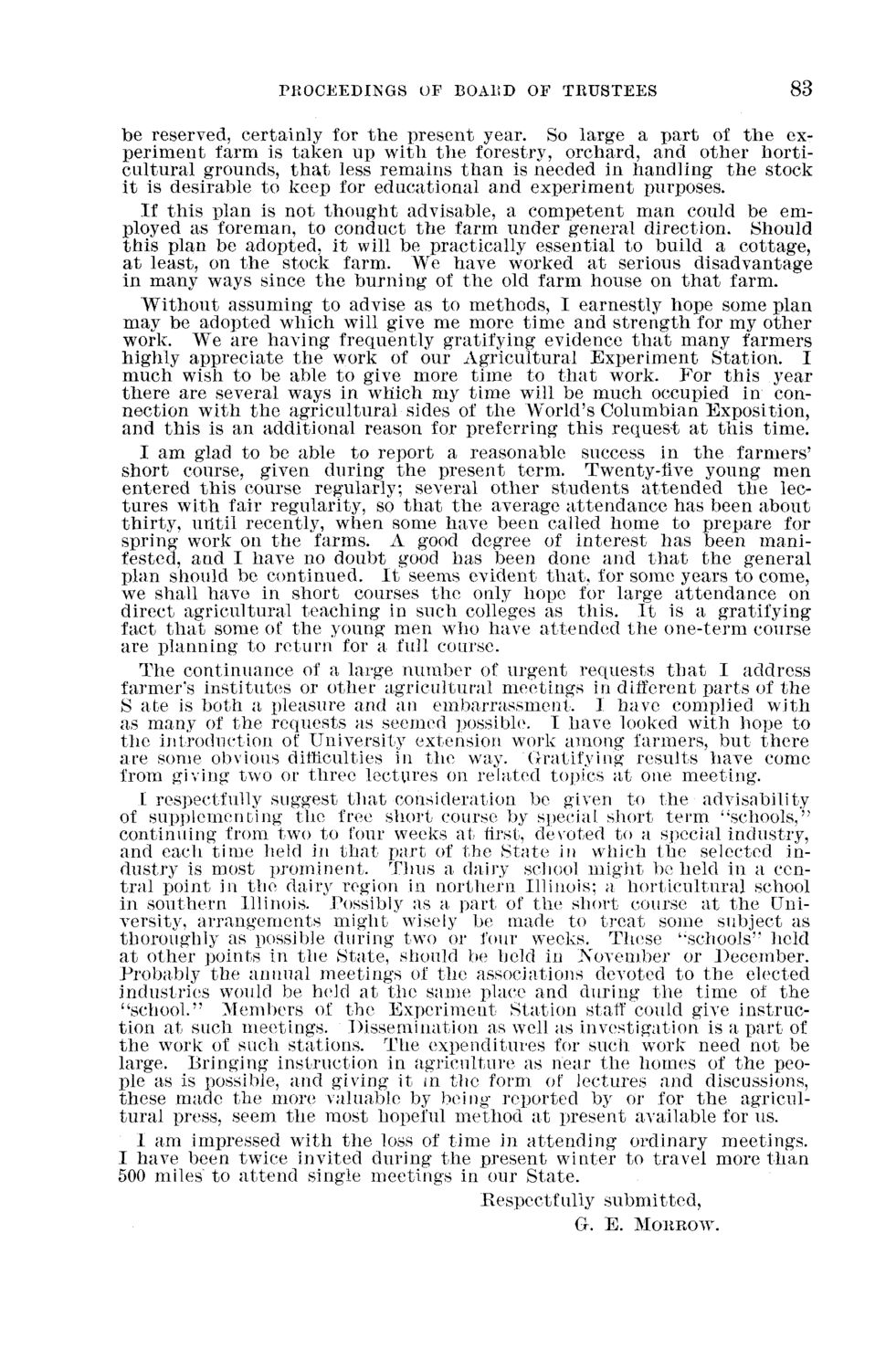| |
| |
Caption: Board of Trustees Minutes - 1894
This is a reduced-resolution page image for fast online browsing.

EXTRACTED TEXT FROM PAGE:
PROCEEDINGS OF BOARD OF TRUSTEES 83 be reserved, certainly for the present year. So large a part of t h e experiment farm is taken up with the forestry, orchard, and other horticultural grounds, t h a t less remains than is needed in handling the stock it is desirable to keep for educational and experiment purposes. If this plan is not thought advisable, a competent man could be employed as foreman, to conduct the farm under general direction. Should this plan be adopted, it will be practically essential to build a cottage, at least, on the stock farm. We have worked at serious disadvantage in many ways since the burning of the old farm house on t h a t farm. Without assuming to advise as to methods, I earnestly hope some plan may be adopted which will give me more time and strength for my other work. We are having frequently gratifying evidence t h a t many farmers highly appreciate the work of our Agricultural Experiment Station. I much wish to be able to give more time to t h a t work. For this year there are several ways in which my time will be much occupied in connection with the agricultural sides of the World's Columbian Exposition, and this is an additional reason for preferring this request at this time. I am glad to be able to report a reasonable success in the farmers' short course, given during the present term. Twenty-five young men entered this course regularly; several other students attended the lectures with fair regularity, so t h a t the average attendance has been about thirty, uritil recently, when some have been called home to prepare for spring work on the farms. A good degree of interest has been manifested, and I have no doubt good has been done and t h a t the general plan should be continued. I t seems evident that, for some years to come, we shall have in short courses the only hope for large attendance on direct agricultural teaching in such colleges as this. I t is a gratifying fact t h a t some of the young men who have attended the one-term course are planning to return for a full course. The continuance of a large number of urgent requests t h a t I address farmer's institutes or other agricultural meetings in different parts of the S ate is both a pleasure and an embarrassment. I have complied with as many of the requests as seemed possible. I have looked with hope to the introduction of University extension work among farmers, but there are some obvious difficulties in the way. Gratifying results have come from giving two or three lectures on related topics at one meeting. I respectfully suggest t h a t consideration be given to the advisability of supplementing the free short coarse by special short term "schools," continuing from two to four weeks at first, devoted to a special industry, and each time held in t h a t part of the State in which the selected industry is most prominent. Thus a dairy school might be held in a central point in the dairy region in northern Illinois; a horticultural school in southern Illinois. Possibly as a part of the short course at the University, arrangements might wisely be made to treat some subject as thoroughly as possible during two or four weeks. These '-schools" held at other points in the State, should be held in November or December. Probably the annual meetings of the associations devoted to the elected industries would be held at the same place and during the time of the "school." Members of the Experiment Station staff could give instruction at such meetings. Dissemination as well as investigation is a part of the work of such stations. The expenditures for such work need not be large. Bringing instruction in agriculture as near the homes of the people as is possible, and giving it m the form of lectures and discussions, these made the more valuable by being reported by or for the agricultural press, seem the most hopeful method at present available for us. I am impressed with the loss of time in attending ordinary meetings. I have been twice invited during the present winter to travel more than 500 miles to attend single meetings in our State. Respectfully submitted, Gr. E. MORROW.
| |